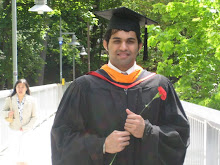42 is the answer to the ultimate question of life, the
universe and everything – according to the book Hitchhiker’s guide to the
galaxy. I could well argue the answer is economics. I could mount a very
successful case that every single thing we do in life has an economic angle to
it; if we pay close attention we will see it. In this article I wish to address
the scourge of terrorism through the prism of economics. I do understand and
appreciate that the word terrorism invokes strong emotions and responses. I
would like to state upfront that the purpose of this article to give a
perspective and not to belittle the many sacrifices made by our armed soldiers
to keep us safe from terrorism every single day. So, here goes.
Ajmal Kasab, the 26/11 attacker captured by India in Mumbai
was facing a trial in India for waging a war against the country, a crime for
which he was executed in 2012. I was reading up on the trial arguments, with
intension to understand what goes in the mind of a terrorist that he/she takes
up a task to kill people in cold blood even at the personal risk of being
captured and punished or getting killed. If we could identify and remedy the
motivation, maybe we can have a shot at addressing this ever growing menace. I
will list down a few points I took away from the deposition of Ajmal Kasab and
make my case for economic solutions to the problem. I am very aware that there
can be more than one motivation for individuals to take up arms and I am not
trying to trivialize the issue to mere economic one. I am making the limited
case that in absence of economic strife, it would become difficult to
radicalize masses easily.
During the course of his deposition, Ajmal Kasab mentioned a
lot of things; for the purpose of this article I am listing the relevant ones.
Kasab came from a poor household in Faridkot, Pakistan and was always bickering
with his family as they did not have the money to buy him clothes or other
stuff. On one such instance, when his father could not buy him clothes for Eid,
he had an argument with his parents and left home. He got involved in petty
theft to satisfy his immediate needs and was identified by “scouts” of
Pakistani terrorist organizations as suitable target for indoctrination and to
be employed as a weapon against India. Kasab gave a lot of details about how he
was trained for using arms and was indoctrinated by his handlers who used to
show him videos of atrocities on Muslims by India and convince him how he was a
“jihadi” fighting the good fight on behalf of Islam. At this point, it is
obvious to wonder if Kasab would have been as easily targeted by the scouts if
he were from a well to do family. Would it have been easy to indoctrinate Kasab
if he or his parents had good job prospects – something to look forward to in
their life? Human psyche is difficult to fathom. If you take away the hope
people behave in erratic ways.
I know I am at the risk of trivializing the issue but I can
prove with facts that it is not as easy to sway a well fed, nicely clothed, well-educated
boy as it is to indoctrinate a poor child who is ignorant due to lack of
education. Around the world, we have
come to understand that the terrorist handlers are wealthy people who are
motivated by hate / xenophobia / racism or other psychological infirmities to wreak
havoc of terrorism on the world. Some handlers
have wealthy benefactors who have a wrested interest in destabilizing the
economy via terrorism so they could make undue profits. In either case, these
handlers do not have the courage to carry out terrorist attacks; they employ
foot soldiers, at a nominal cost and promise to pay lots of money to their
family in case he/she dies while performing the task. Often times, there is a societal
push received by these foot soldiers in form of riots / crimes against family
members or a general sense of victimhood. Now we have a potential breeding ground for
terrorist foot soldiers. It is not my case that each person who undergoes
economic strife or societal indifference gets indoctrinated; I am saying that
most terrorists who are apprehended by the authorities have this story to
narrate. Obviously, this rule is not a gold standard but it is observed that if
we take away the economic side of the equation, the potential of young children
getting ensnared in this mess can be greatly reduced. Every local authority
stores information on vulnerable sections of society, with adequate and targeted
support via good jobs / micro finance and counselling, the Government can prevent
our vulnerable children from being way led into the world of terror and
destruction. If terrorist handlers can employ scouts to identify targets, surely
a Government with all the agencies at its disposal can do a better job of targeting
economic help, provide job opportunities to vulnerable families and use its
schemes to keep their children in schools where they can receive good education
and be counselled to make them good citizens. It is not an easy task but if it
is possible for terrorists to identify them, we should be doing a better job.
Finally, my heart goes out to all those who have lost their
loved ones to mindless violence / terrorism and I cannot imagine what it is to
be a survivor of such incidents. I am doing my bit to help by attempting to analyze the psyche of a terrorist and
suggest possible solution to stop mass indoctrination of children by terrorist
handlers.
